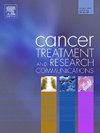Real-world progression-free survival of first line afatinib patients with EGFR-mutant advanced lung adenocarcinoma: A multicentre study in Indonesia
IF 2.4
Q3 Medicine
引用次数: 0
Abstract
Introduction
Afatinib, a second-generation EGFR tyrosine kinase inhibitor (TKI), has demonstrated clinical benefit in EGFR-mutant non-small cell lung cancer (NSCLC) through clinical trials. However, real-world data, particularly in Southeast Asian populations, remain limited. This study aimed to evaluate the real-world progression-free survival (PFS) of Indonesian patients with EGFR-mutant advanced lung adenocarcinoma treated with first-line afatinib.
Methods
A retrospective cohort study was conducted using data from 1008 EGFR-positive NSCLC patients screened between 2019 and 2023 across 14 Indonesian centers. Of these, 215 received afatinib, and 105 patients met eligibility criteria. Clinical and demographic data, including EGFR mutation types and ECOG performance status, were collected. Kaplan-Meier and Cox regression analyses were used to assess PFS and associated factors.
Results
The median age was 59 years; 54.3 % were female and 65.7 % never-smokers. Exon 19 deletion was the most common mutation (57.1 %), followed by L858R (29.5 %). Median PFS was 12.0 months. ECOG performance status significantly influenced PFS: patients with ECOG 0–1 had a median PFS of 13.0 months versus 8.0 months for ECOG ≥2 (HR = 0.44; p = 0.001). Other variables, including smoking status, stage, and brain metastases, were not significantly associated with PFS. Mutation subtype analysis revealed non-significant trends.
Conclusion
ECOG performance status is a significant prognostic factor for PFS in patients treated with first-line afatinib. These real-world findings support its continued use and highlight the need for broader multicenter studies to validate the role of EGFR mutation subtypes in treatment outcomes.
一线阿法替尼治疗egfr突变晚期肺腺癌患者的真实无进展生存期:印度尼西亚的一项多中心研究
通过临床试验,第二代EGFR酪氨酸激酶抑制剂(TKI)阿法替尼(afatinib)在EGFR突变的非小细胞肺癌(NSCLC)中显示出临床益处。然而,真实世界的数据,特别是东南亚人口的数据仍然有限。本研究旨在评估印度尼西亚egfr突变晚期肺腺癌患者接受一线阿法替尼治疗的真实无进展生存期(PFS)。方法回顾性队列研究使用了2019年至2023年在印度尼西亚14个中心筛选的1008例egfr阳性NSCLC患者的数据。其中,215名患者接受了阿法替尼治疗,105名患者符合资格标准。收集临床和人口统计数据,包括EGFR突变类型和ECOG表现状态。Kaplan-Meier和Cox回归分析评估PFS及相关因素。结果患者中位年龄59岁;女性占54.3%,从不吸烟的占65.7%。外显子19缺失是最常见的突变(57.1%),其次是L858R(29.5%)。中位PFS为12.0个月。ECOG表现状态显著影响PFS: ECOG 0-1的患者中位PFS为13.0个月,而ECOG≥2的患者中位PFS为8.0个月(HR = 0.44;P = 0.001)。其他变量,包括吸烟状况、分期和脑转移,与PFS没有显著相关。突变亚型分析显示无显著趋势。结论ecog功能状态是一线阿法替尼治疗患者PFS的重要预后因素。这些现实世界的发现支持其继续使用,并强调需要更广泛的多中心研究来验证EGFR突变亚型在治疗结果中的作用。
本文章由计算机程序翻译,如有差异,请以英文原文为准。
求助全文
约1分钟内获得全文
求助全文
来源期刊

Cancer treatment and research communications
Medicine-Oncology
CiteScore
4.30
自引率
0.00%
发文量
148
审稿时长
56 days
期刊介绍:
Cancer Treatment and Research Communications is an international peer-reviewed publication dedicated to providing comprehensive basic, translational, and clinical oncology research. The journal is devoted to articles on detection, diagnosis, prevention, policy, and treatment of cancer and provides a global forum for the nurturing and development of future generations of oncology scientists. Cancer Treatment and Research Communications publishes comprehensive reviews and original studies describing various aspects of basic through clinical research of all tumor types. The journal also accepts clinical studies in oncology, with an emphasis on prospective early phase clinical trials. Specific areas of interest include basic, translational, and clinical research and mechanistic approaches; cancer biology; molecular carcinogenesis; genetics and genomics; stem cell and developmental biology; immunology; molecular and cellular oncology; systems biology; drug sensitivity and resistance; gene and antisense therapy; pathology, markers, and prognostic indicators; chemoprevention strategies; multimodality therapy; cancer policy; and integration of various approaches. Our mission is to be the premier source of relevant information through promoting excellence in research and facilitating the timely translation of that science to health care and clinical practice.
 求助内容:
求助内容: 应助结果提醒方式:
应助结果提醒方式:


